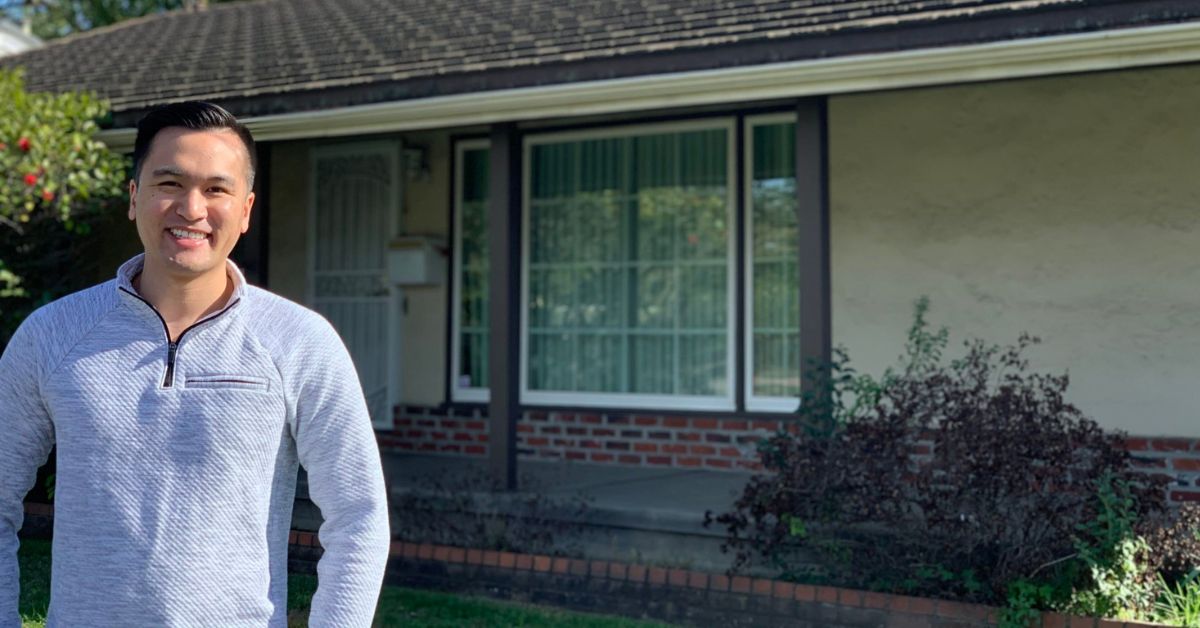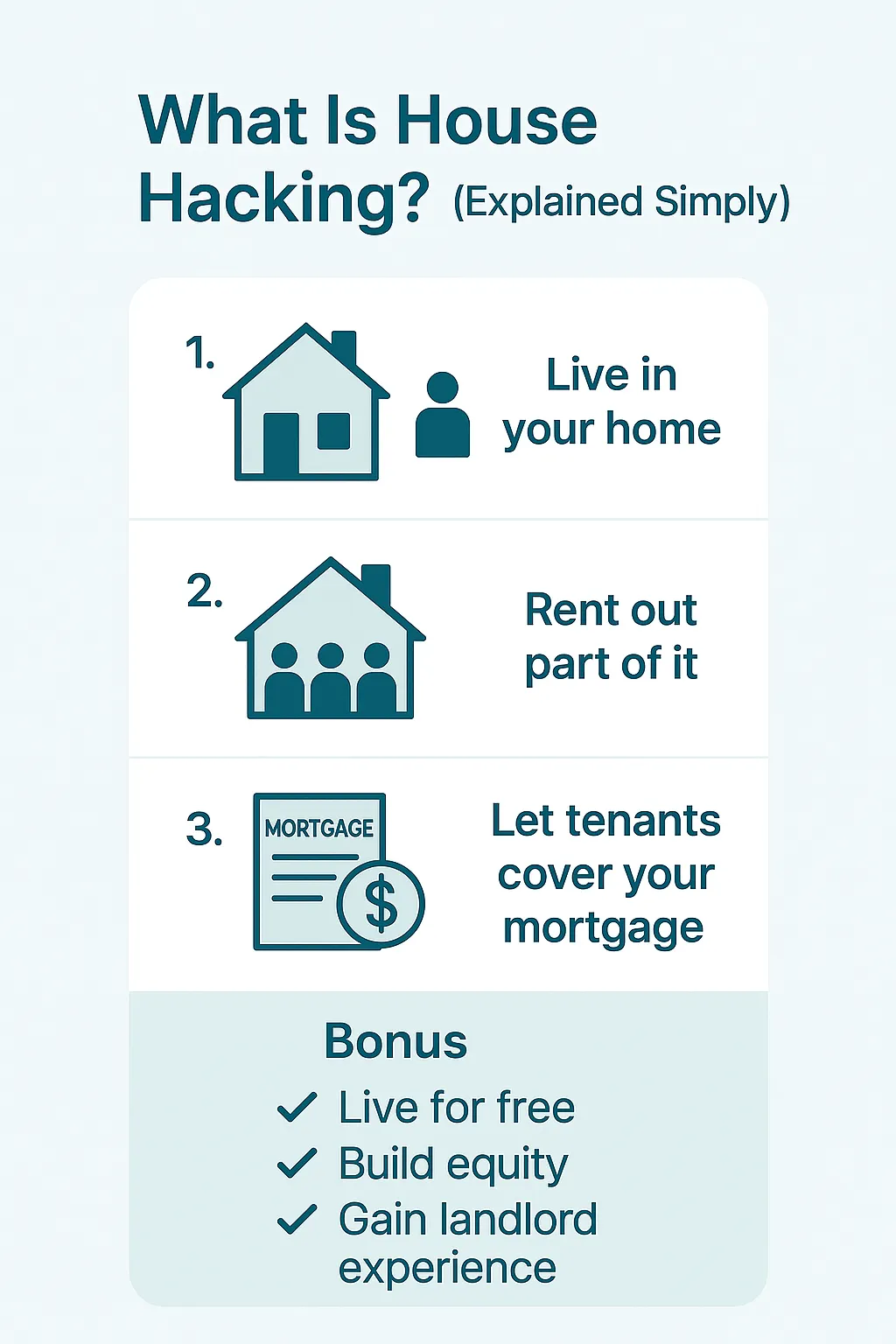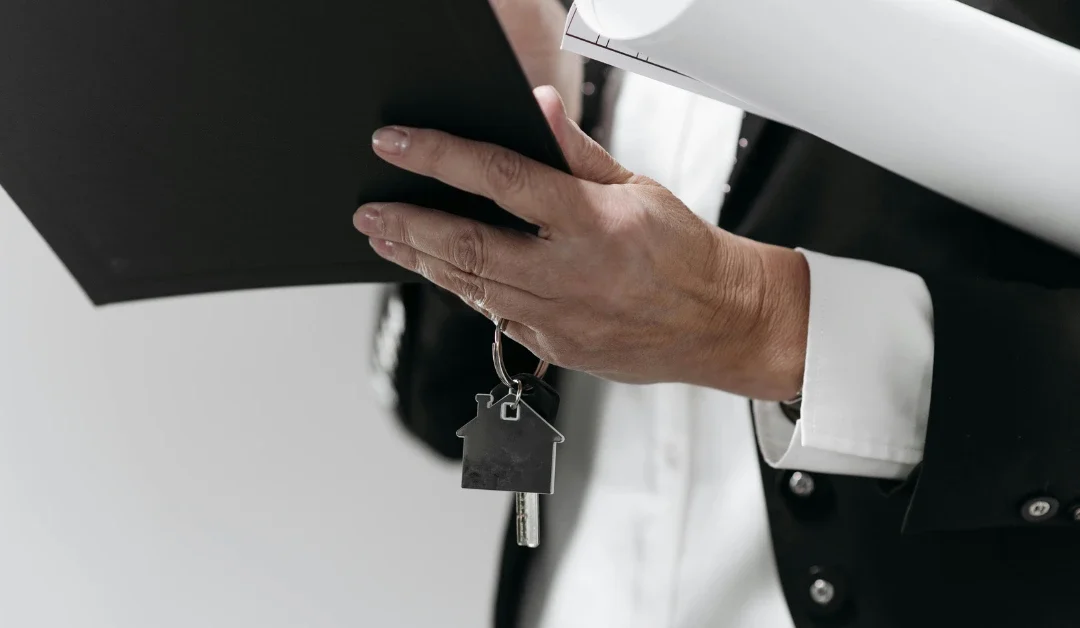Want to learn how to house hack from someone who’s built a 7-figure real estate portfolio through trial and error?
If so, you’re probably where I used to be.
Before I started investing, I worked a demanding 9-5 job that left me dreading Monday mornings. I knew there had to be more to life than counting down to the weekend.
After years of research, mistakes, and finally success, I created multiple stable income streams from real estate that allowed me to retire in my early 30s. And I did it while living completely rent-free in one of the most expensive real estate markets in the country – California.
Want the same freedom? Here’s exactly how I did it.
Key takeaways:
- You can eliminate your housing costs completely by renting out part of your home—even in expensive markets like California (I’ve done it for 6+ years).
- House hacking is one of the fastest, lowest-cost ways to start building a real estate portfolio with minimal capital.
- By using owner-occupied financing and targeting ideal tenants, you can turn your home into a powerful wealth-building asset (I’ve built over $1M in equity this way).
What you’ll learn: How to house hack:
What is house hacking?
House hacking means generating income from your primary residence while you live in it.
For example, I rent out three spare bedrooms in my four-bedroom home to college students. The rental income completely covers my $2,288 mortgage payment and generates $1,332 in cash flow allowing me to live essentially for free while building equity.

I invest in other properties, too, and that’s how I’ve been able to build a seven-figure portfolio.
But house hacking goes beyond just renting out rooms.
It’s a powerful strategy that allows you to:
- Live for free (or significantly reduce your housing costs) by having tenants pay your mortgage
- Build wealth passively without trading your time for money
- Gain real-world landlord experience before investing in standalone properties
- Break into real estate investing with minimal capital
- Leverage owner-occupied financing (lower down payments and better interest rates)

Take my client Andy. He has a $700 cash flow, while he lives in his property rent-free:
For a quick overview of how I structure my deals, take a look at this short video:
Ready to learn more? Then, let’s talk about strategies that’ll maximize your success.

6 proven house hacking strategies (with real examples)
There are multiple approaches to house hacking, depending on your property type, comfort level with tenants, and financial goals:
1. Large single-family homes
If you have extra space in your home, start here. You can rent out an extra bedroom, or get creative and rent out office space for remote workers.
Real-life example: I rent three bedrooms in my four-bedroom home to college students, generating $1,332 monthly in passive income. My rental income also completely covers my $2,288 mortgage.
Here’s how I do it:
Pro tip from my experience: Target a specific tenant demographic. I specifically market to students because there is constant demand for off-campus housing.
2. Multi-family properties
With a multi-family unit, you can live in one unit and rent out the rest of the property, without having to share common areas with your tenants.
3. Short-term rentals
If you live in a popular tourist area, renting out part of your property during peak season can be a profitable way to house hack. Instead of renting on a per-month basis, you could rent by the night or by the week for a higher rate.
4. Self-contained residential units on your property
Accessory dwelling units (ADUs) are designed to add extra living space to properties, especially in areas that have limited housing. Once approved, you could rent out ADUs for recurring passive income.
5. Off-street parking, garage, or yard rental
By taking the house hacking concept a step further, you could collect rental income from many different sources, not just an extra bedroom. For example, consider renting out a portion of your backyard for boat storage.
6. Live-in flips
You could save a lot of money on housing by living in a property as you renovate it. And once it’s fully renovated, you can decide to sell it or rent out extra rooms if you want to.
Okay, now that you have an overview of the strategies, let’s talk about how to be successful with house hacking.
5 steps to start house hacking successfully (even if you’re completely new)
Ready to get started? Follow these five steps to maximize your house hacking success:
1. Understand your finances
How much capital do you need to start investing? The short answer is, it depends.
If you already own your home and want to rent out extra rooms, you won’t need to secure an additional mortgage. But if you want to invest in a new property and need financing, consider buying a single-family home.
Common qualifications for mortgage approval:
- Credit score: you should have a credit score of at least 580 for an FHA loan or 700+ for a conventional loan
- Debt-to-income (DTI) ratio: your DTI ratio should ideally be under 36%
- Stable income: be prepared to show two years’ worth of consistent income
Action step: Pull your free credit report, list all debts, and calculate your DTI ratio (total monthly debt payments ÷ gross monthly income).
2. Find the right property (or optimize what you already have)
If you’re buying a new property:
- Set clear criteria: Location, property type, number of bedrooms/bathrooms, and potential rental income
- Use online platforms: Zillow, Realtor.com, and local multiple listing services
- Network with real estate agents: Find investor-friendly agents who understand house hacking
- Run a thorough cash flow and ROI analysis: Calculate all expenses (mortgage, taxes, insurance, maintenance) against projected rental income to understand cash flow and return on investment
If you’re using your current home:
- Identify unused or underutilized spaces: Spare bedrooms, basement areas, garage space
- Evaluate necessary modifications: Does the space need a separate entrance, bathroom, or kitchenette?
- Check zoning and HOA restrictions: Ensure your plans comply with local regulations
Action step: Create a detailed spreadsheet comparing potential properties or renovation options, including all costs and potential rental income.
3. Secure optimal funding
The right financing can dramatically impact your success:
- FHA loans: As low as 3.5% down payment, ideal for multi-family properties up to four units
- VA loans: 0% down for qualified veterans, can be used for properties up to four units
- Conventional loans: Typically require 5-20% down, but offer better interest rates
- Home equity loans/HELOCs: Great options if you’re modifying your current home
Pro tip: Owner-occupied loans offer significantly better terms than investment property loans. Most require you to live in the property for at least 12 months.
Action step: Contact at least three different lenders to compare loan options, interest rates, and closing costs.
4. Find your ideal tenants
The quality of your tenants directly impacts your house hacking experience:
- Define your ideal tenant profile: Consider lifestyle, occupation, and lease duration
- Market effectively: Advertise where your ideal tenants look (college bulletin boards, Facebook groups, professional networks)
- Screen thoroughly: Credit checks, income verification, previous landlord references, and background checks
- Create clear agreements: Detailed leases that outline responsibilities, rent payment details, and house rules
Action step: Create a comprehensive tenant screening process document to ensure consistency.
Not sure who your ideal tenants are? Take a look here:
5. Manage your property like a pro
For everyday property management, you can outsource or do it yourself. My take? Self-management can save you a lot of money and isn’t necessarily that time-consuming.
I do what I call tenant empowerment, which involves:
- Set clear boundaries: Establish quiet hours, shared space rules, and guest policies
- Create systems for maintenance: Develop procedures for repair requests and emergencies
- Communicate regularly: Monthly check-ins prevent small issues from becoming big problems
- Maintain detailed records: Track all income, expenses, and communication for tax purposes
Action step: Create a “house manual” with all relevant information about the property, rules, and emergency procedures.
And if you decide to hire out, though, sign a contract with the property manager to outline your expectations and protect yourself legally.

FAQs: How to house hack successfully
Is house hacking a good investment?
Absolutely. House hacking is a great investment that can help you eliminate your mortgage and build passive income. Over time, you can use that income to invest in more properties, which is what I did. And now, my portfolio is worth seven figures.
How long do you need to live in a house to house hack?
If you use an owner-occupied loan (like FHA or conventional), lenders typically require you to live in the property for at least 12 months. After that period, you have the flexibility to:
- Continue living there and collecting rental income
- Move out and convert the entire property to a rental
What are the tax implications of house hacking?
House hacking offers significant tax advantages:
- Rental income deductions: You can deduct expenses related to the rental portion of your property, including utilities, repairs, and insurance
- Depreciation benefits: You may be able to claim depreciation on the rental portion of your property
- Mortgage interest deductions: These may apply to both your personal and rental portions
Important: Tax laws are complex and change frequently. Consult with a tax professional experienced in real estate investing to maximize your benefits.
Is house hacking legal?
House hacking is completely legal, but you need to ensure compliance with:
- Local zoning laws: Some areas restrict the number of unrelated people who can live in a single-family home
- HOA regulations: If applicable, check for rental restrictions
- Building codes: Especially important if creating a separate unit or making structural changes
- Short-term rental laws: Many cities have specific regulations for Airbnb-type rentals
Always check with local authorities before implementing your house hacking strategy.
Ready to start your own profitable house hack?
Now you know exactly how to house hack successfully, based on my decade of real-world experience.
But house hacking is just the beginning. After successfully implementing this strategy, many of my clients have gone on to build substantial real estate portfolios, replacing their job income and achieving true financial freedom.
Just like I did myself.
And if you’re serious about building wealth through real estate but need guidance on getting started, I can help. My coaching program has helped dozens of beginning investors replicate my success and build their own path to financial independence.
Click here to learn more about working with me and accelerate your journey to financial freedom through real estate.


